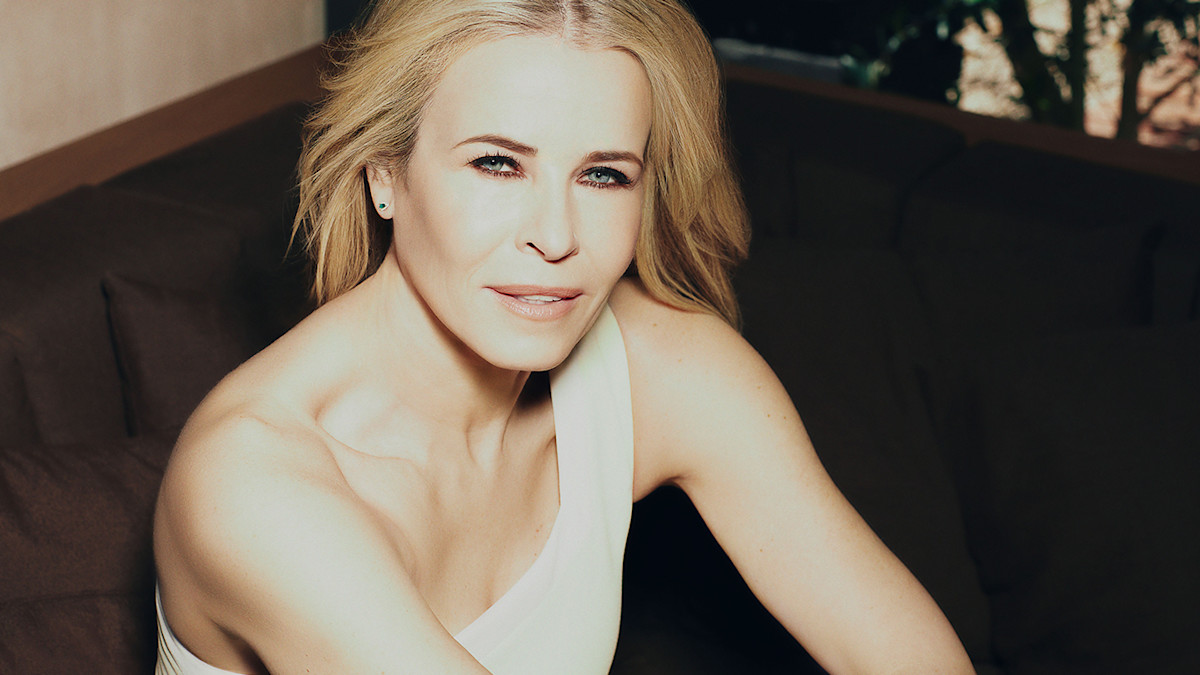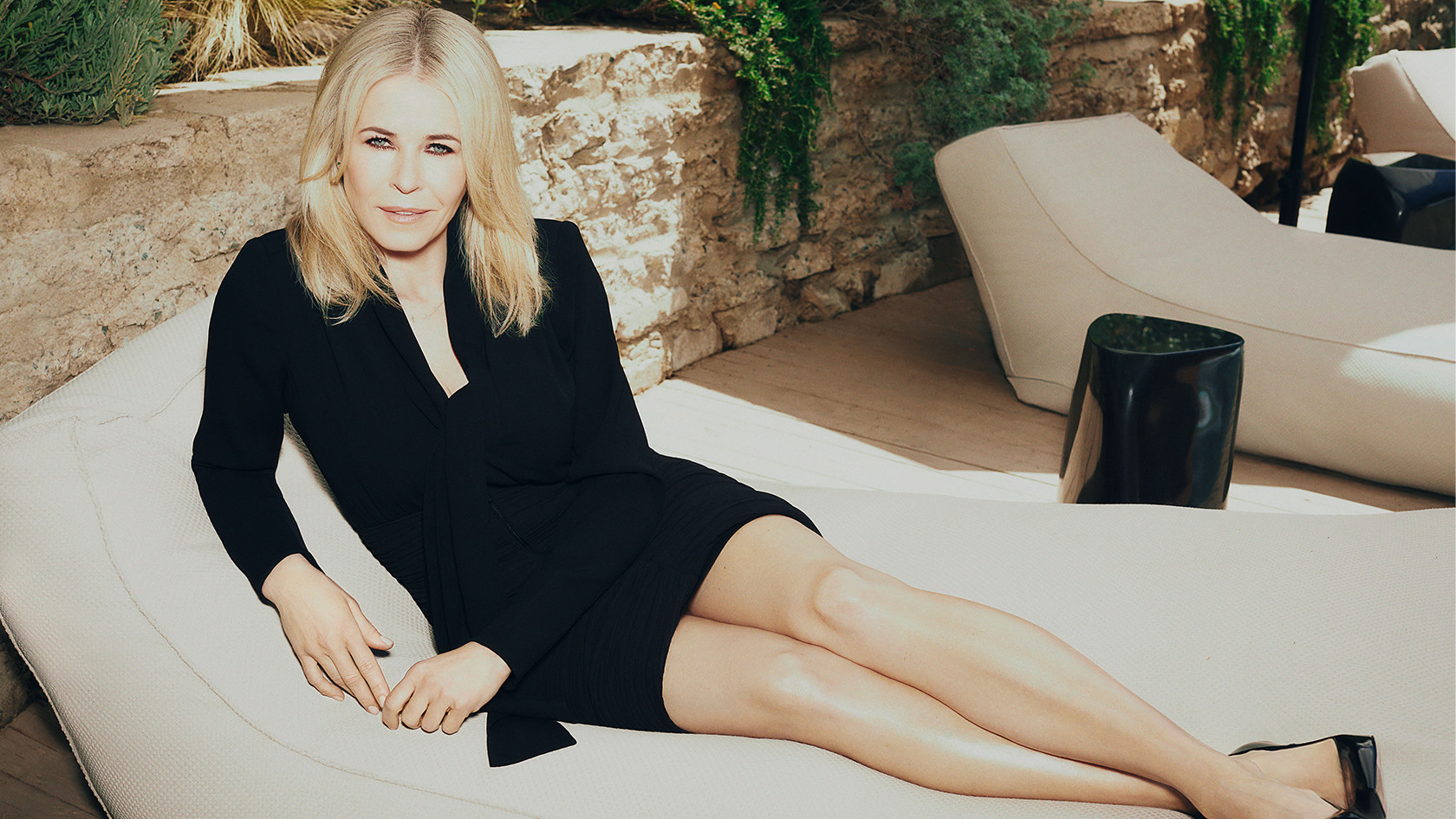
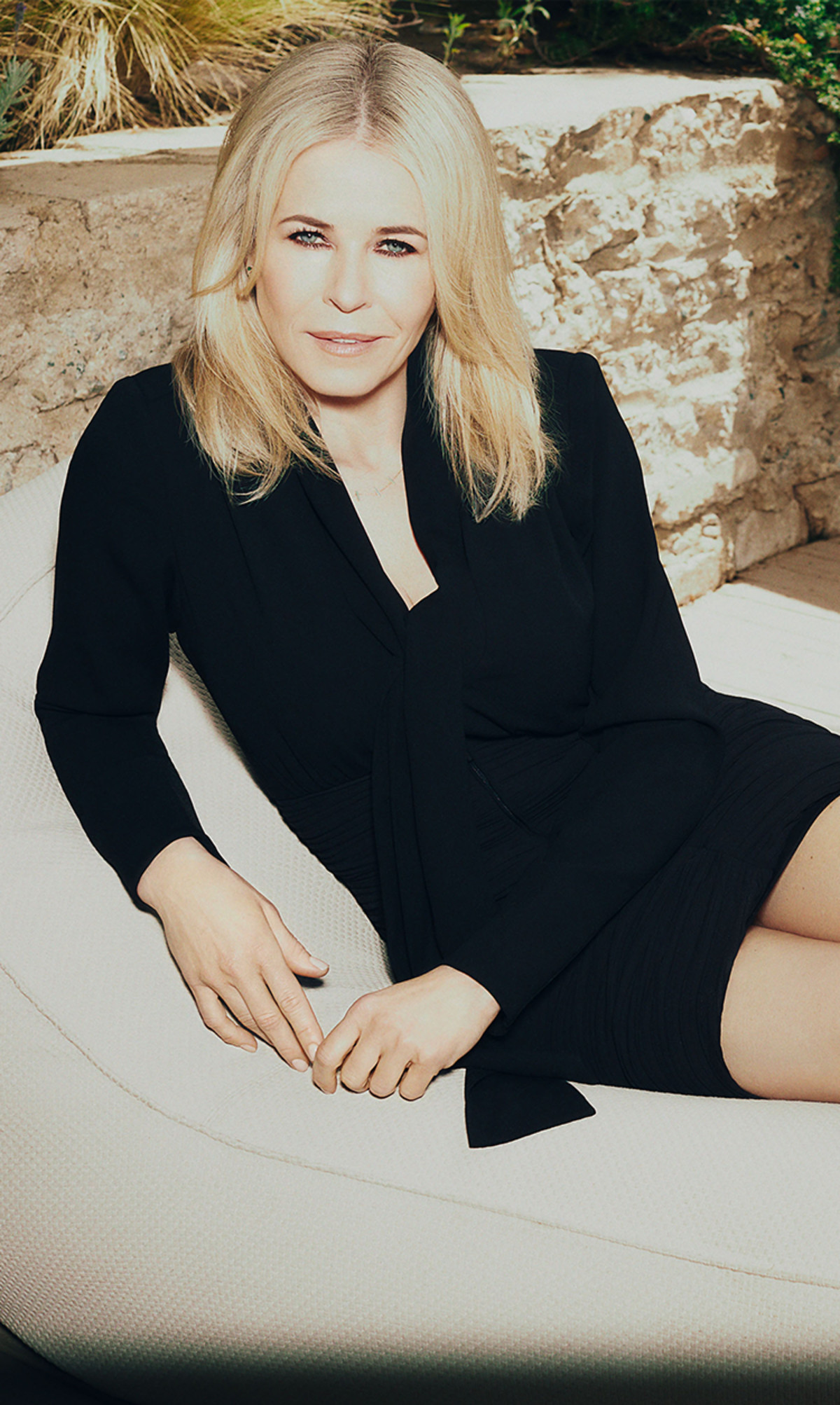


CHELSEA HANDLER
Sight Seeker
PHOTOS BY mike rosenthal WORDS BY TAMARA RAPPA
Chelsea Handler's Ever-Expanding Vision
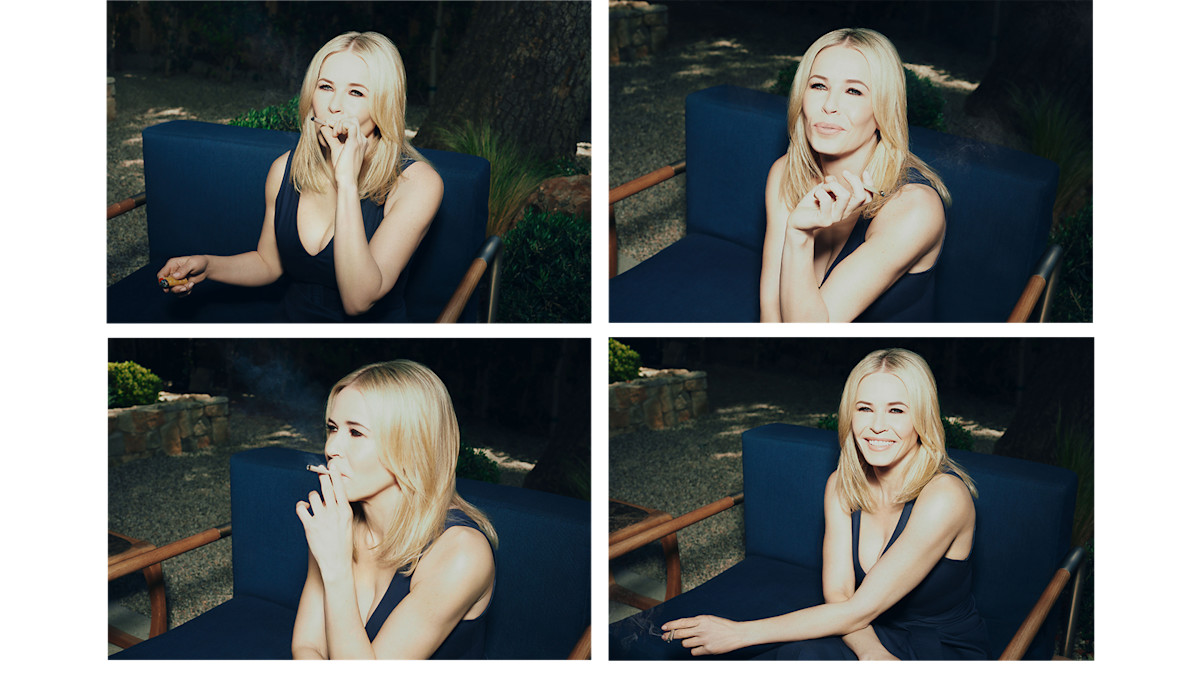
ABOVE PHOTO:Dorothee Schumacher Dress; Stuart Weitzman Pumps; Jennifer Meyer Necklace, Chelsea's own. G Label Dress; Sarah Flint Pumps.
Listen to the extended interview on episode 75 of the Story + Rain Talks podcast. Available on Apple Podcasts, Spotify, and wherever you listen.
Tamara Rappa: I want to talk about your talk show series for Netflix. I absolutely love that combination of content. The skits; a little BTS; the traditional talk show piece, all combined with your interviews of people like teachers and activists, former prisoners--- and my favorite, the dinner party conversations. You've said you're burned out on interviewing, but do you see yourself coming back to the talk show medium? Are there plans for that, even loose plans? I think a dinner party conversation series from you would be fantastic.
Chelsea Handler: That would be fun, actually. The dinner parties are always fun to do, but I usually incorporate those into a documentary series that I'm doing. I'll always try and throw them in, whether it's a talk show, or a documentary, or any way I can incorporate them, because it's nice to have real conversations with celebrities. For a long time you'd only see celebrities promoting their projects rather than getting personal. Now we're living a different kind of vibe. The more personal, the better.
TR: Those conversations flowed so well. They were just such great conversations.
CH: That's why alcohol is a good thing to have, to lubricate your guests with. If you want people to talk, you should give them a little alcohol.
TR: I was watching those episodes and thinking, are people actually drinking? Is it really water in their glasses?
CH: No, most people were drinking. Some people didn't drink, but they were obviously not invited back, which is fine, because it's a one-time dinner party. You don't need to invite them back.
TR: You've literally interviewed everyone: actors, politicians, spacemen, activists. Which group do you like talking to the most, or is variety the spice of life?
CH: I really like to learn when I'm talking to someone. I'm interested. I want to learn about what they know, and I like studying people. I think it's interesting to hear about people's lives. I like interpersonal affairs, all of that stuff. So there's not a favorite. I was just burned out on celebrities for a while because it was all I did. And I felt like I had so much more to share and so much more to learn. So, yes, I could see myself coming back to it now, now that I've had enough space from it, and I'm getting to do the projects that I really want to do, projects with meaning. I think I'd have a much clearer vision for how I'd want to proceed with a show like that. It will probably happen at some point.
“In order to have any evolution, you have to become self aware and actually find out shitty things about yourself, and deal with them. But I'm brave, so I had no problem going in there and saying, 'Okay, give me the short, the long, the dirty, the bad and the ugly.'”
TR: What makes for a bad guest?
CH: Somebody who can't be real.
TR: Does that happen a lot? What is the ratio of people showing up versus not showing up?
CH: It happens a lot. Probably 70/30. Seventy percent of guests are there, but I guess it depends what you're interviewing someone about. That's regarding celebrities. Thirty percent of people don't have a lot to say and are very nervous. Alcohol is a great elixir for that. It's about, are you able to put people at ease, are you a conversationalist? Remember when Jay Leno would interview people? It wasn't like there was rapport; he was a late night comic. There were two separate entities there. Things have evolved, now it's different. People have to have conversations. You can't just do an interview, there's no charm in that.
TR: What kind of guest is intimidating to you, or is that no longer the case? I loved your bit with Maria Shriver, where she was critiquing your interview style and giving you tips. Is there anyone who intimidates you at this point, in terms of an interview?
CH: No. I'm more relaxed in an interview setting than I probably am in person. I love the formality of being able to interview someone, because, obviously, I'm not formal. So once I'm in that position I can always have fun with it, because it's my job to ask them questions---and that's what I would want to do anyway. It's intimidating to me when people are shy. That intimidates me, because it's hard to get in.
TR: Speaking of interviews, what are your thoughts on Harry and Meghan?
CH: I think she's very brave.
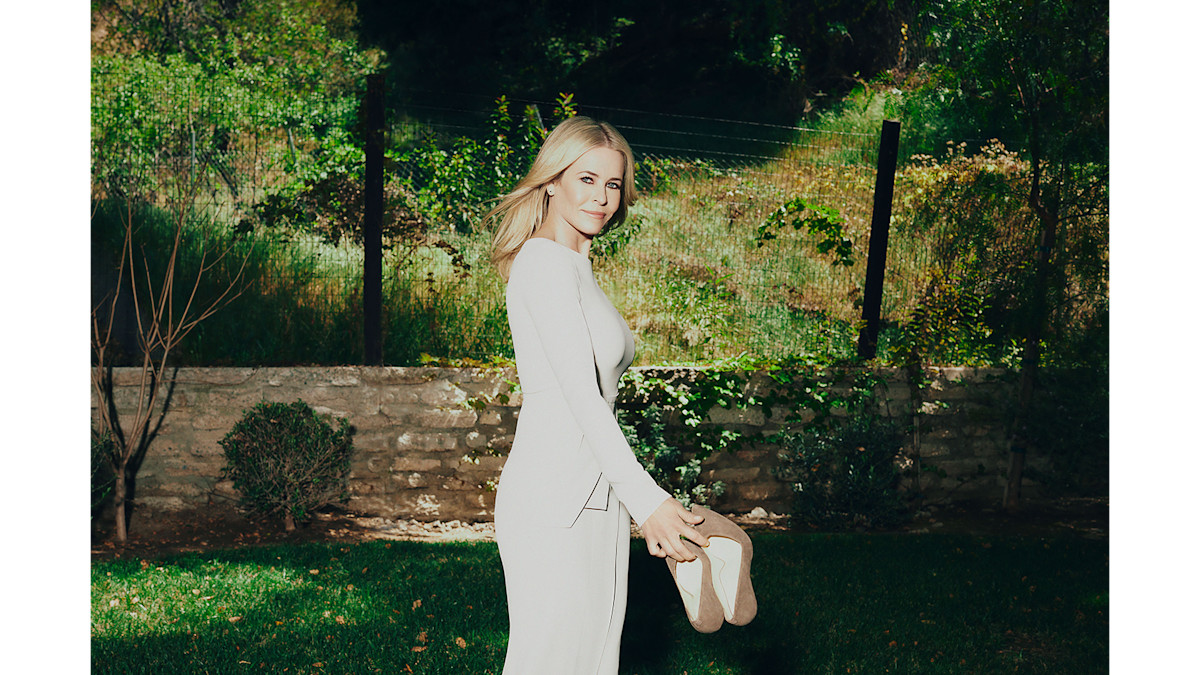
Roland Mouret Dress; Sarah Flint Pumps.
TR: Do you ever feel drained after your interviews? If so, how do you recover from giving away all that energy?
CH: No, I don't feel drained at all. Only if it's terrible, and I was there with them for, like, an hour. Then it can be draining. Otherwise, no. It's always an adventure, right? Talking to someone you don't know is always a little adventure. If you can hit it off, then that's even more fun, and surprising, because you don't know the person and you can have comedy between yourselves. You understand the other person's shtick. But when you don't hit it off or you're not jelling, that can be a little bit taxing.
TR: How is the energy that you expel and take in from stand up different from the energy that you expel and take in when creating and hosting either a series, or a documentary, or talk show?
CH: With a series or documentary or talk show, you are interacting with other people, so it's natural for it not to be all about you. It's a conversation, and your focus isn't solely on you. With stand up, you're the only person up there holding the microphone. So you're the only person that could be heard in the entire stadium, or theater, or wherever you're performing, or comedy club. Stand up is a very, very self absorbed medium. You have to be really into talking about yourself.
TR: Does that feel better, more comfortable? You've got everyone's attention, and everyone's obviously paid money to be there to listen to you.
CH: For me, being with other people feels more comfortable. I love being on stage though, and doing stand up. I love that feeling. I love that control you have over the room. I love that people have invested in being there. Each of them have different elements, but are both rewarding in their own right.
“All of the sudden, people would see me coming and be like, 'Oh, my God, get away from me. All she talks about is Donald Trump. Get out of the way.'”
TR: I've been thinking a lot about your house and how much of your work occurs in and is filmed in your beautiful home. Your home seems to mean a lot to you, it seems like your haven. Do you ever find it hard to open up your haven for work? Do you ever think you should do less of it, or do you love doing it?
CH: I love sharing my home with anyone. If I'm not there, I want people staying in it because I like for my home to be used. I just sold that house though. Currently I'm in Whistler, Canada. I came here for three months during winter, and sold that house. I come to Whistler every winter to ski. When I go back to LA, I'm moving into a rental house, which is where we're going to be shooting our cover story...at a house I've never been in. I'm on the hunt for a house. I have to get back home, and house hunt. I started looking for a house but I didn't find one before I left. I figured, 'Fuck it. I'll get one when I get home.'
TR: Why did you decide to move?
TR: I felt like I was getting a little too comfortable in my house, and I needed to shake shit up.
TR: You're from the East Coast, from New Jersey. How and why do you believe you've assimilated to LA so well? What's your relationship like with Los Angeles?
CH: Well, you have to understand, I've felt like I belonged in Los Angeles from when I was born. I thought New Jersey was not where I was supposed to be. So I've always thought that LA is the place for me. It's such a natural fit. It does feel like home. That's where I will always consider home, though I spend a lot of time in different places now. I have no desire to live in LA all year round.
“'Who am I and what am I here to do? Is it just to collect? No. It can't be that. It's to contribute, right? And it's to connect.' I had a little bit of a growth spurt at 40.”
TR: You've evolved in recent years, emotionally. That caused you to shift priorities, ways of thinking, ways of living. The trigger for that was your work with your psychiatrist, when you began to analyze your childhood and confront pain and truths. Your most recent stand up is aptly titled, Evolution, released on HBO Max. You've said that Donald Trump was a big trigger for your evolution. After he was first elected, you became very angry and it forced you to seek some personal guidance to make a change. Your talk show at the time dealt heavily in politics. Do you blame the talk show content for winding you up, day-to-day? Might you have done things differently? Or do you believe the opposite--- that it was necessary for your transformation, and necessary to put that content out there?
CH: My reaction to Donald Trump becoming our president was just like a spoiled little girl who had always gotten her way, and all of a sudden, it wasn't her way. I had to really look at that. In order to have any evolution you have to become self aware, and actually find out shitty things about yourself, and deal with them. But I'm brave, so I had no problem going in there and saying, 'Okay, give me the short, the long, the dirty, the bad and the ugly.' Paying someone to tell you what's wrong with you is a great transaction that not everyone can afford, so I took it very seriously. I found out a lot about myself, and I found out a lot about my entitlement and my selfishness, and the way I've moved through the world in certain respects, and at such an alacrity. I was avoiding one of the biggest heartbreaks of my life. It resulted in all this commotion. You become very introspective. You start to think, 'What would I be like if that event hadn't happened? Would I be a different person? Would I even be in this position? Would I have had the need to prove myself to everyone?' All of that stuff. You start to think, "Who am I and what am I here to do? Is it just to collect? No. It can't be that. It's to contribute, right? And it's to connect.' I had a little bit of a growth spurt at 40.
“It's understandable that some women don't want to hang out with other women, and then the opposite is also understandable. If you can't connect with someone because they're not a girl's girl, that's unfortunate. You don't need to be friends with everyone anyway. There are too many people.”
TR: Were there any other factors that contributed to your making a change? How did you know enough was enough? Were you hard to be around? Were your friends telling you to take a look at yourself?
CH: Yes, yes, definitely. I was hard to be around. I was angry all the time. I was addicted to the twenty four hour news cycle. But that was just something to throw my anger at. It was the perfect thing to be angry about, when in fact the anger was much more deeply rooted. And it became unmanageable. Everyone says you wake up to yourself when it starts to become unmanageable, right? The thing that's working for you no longer works for you. My anger was funny and silly...and then it got really angry. All of a sudden, people would see me coming and be like, 'Oh, my God, get away from me. All she talks about is Donald Trump. Get out of the way'. I'm very perceptive. That's how it all went down, and I'm a much better person for it. I'm much more self aware, and I'm proud of myself now. I like everything I do, all the decisions that I make. Instead of going back and thinking I could've said something a little differently, I say things the right way now.
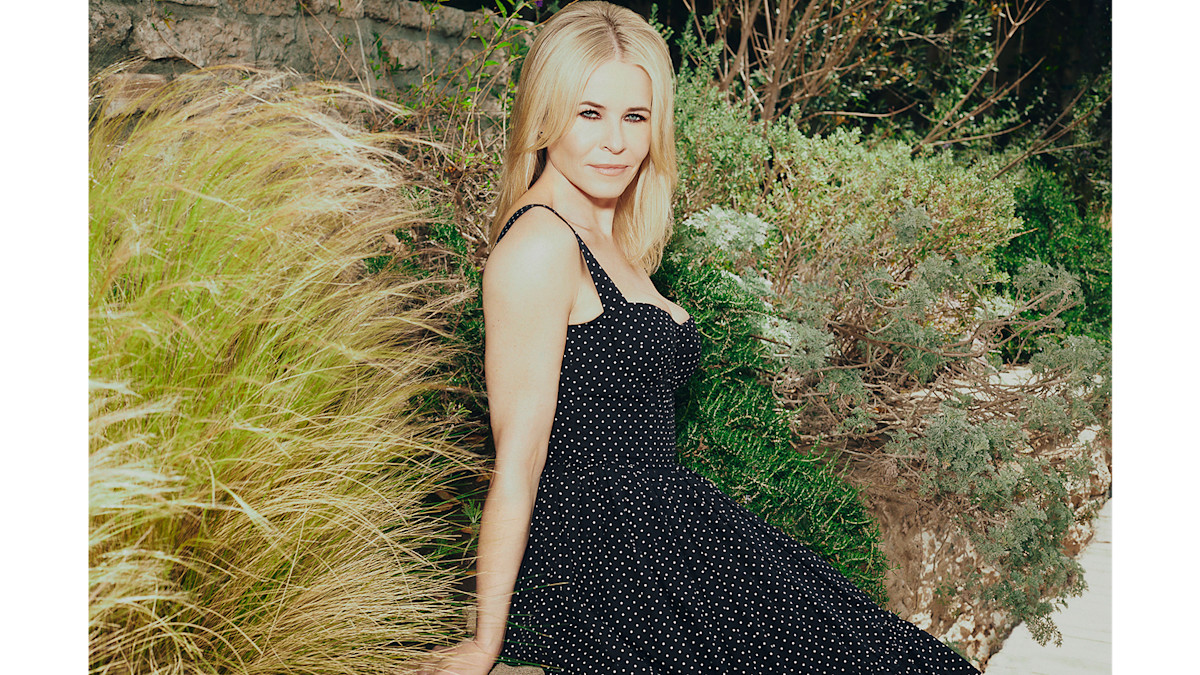
Dolce + Gabbana Dress.
TR: Friendship is so important to you, and you have a lot of friends. There is, of course, your friend Mary, and so many others. Jennifer Anniston called you the kindest, most generous, most authentic person. Do you believe in the idea of some people being or not being a 'girl's girl'? What does that mean to you?
CH: What it means is that they don't have a lot of girlfriends, and that they're kind of solo, loners. I know a lot of women like that, but there are also a lot of women that don't want to be in big groups of women. You know what I mean? We have a history of discriminating against each other. It's understandable that some women don't want to hang out with other women, and then the opposite is also understandable. I've learned a lot about being open to other people's thoughts and perceptions, even when they're not my own. I try not to judge other people, because, who cares? If you can have a connection with someone, that's really all that matters. You can't force other people to have connections with other people. If you can't connect with someone because they're not a girl's girl, that's unfortunate. You don't need to be friends with everyone anyway. There are too many people.
“My generosity is always, always good because I love to give, and I love to show up for people, and I don't care if it's too generous. There's no bad side to it for me. It gives me joy and it gives me purpose.”
TR: I've personally found that many women who are the most vocal about women supporting women are often secretly not. Have you experienced that too?
CH: Yes. I have experienced that but I would rather give volume to the women who are.
TR: Have your friendships shifted, strengthened, or been edited down since your recent evolution? And because you're a generous person, have you perhaps found that you've curtailed that side of you, that side that likes to fix and to give away to people? How did your emotional shift affect your friendships?
CH: First of all, I have not curtailed that. My generosity is always, always good because I love to give, and I love to show up for people, and I don't care if it's too generous. There's no bad side to it for me. It gives me joy and it gives me purpose. My friendships have definitely changed since I went to therapy. It's weird; you become a different person. I became a different person, I think, in a complete overcorrection. I became too internalized. I didn't share, I didn't insert myself. I barely talked at a couple of dinner parties because I was trying to hold back. People eventually said 'What the hell is going on with you? Where ARE you?' And then I thought, oh wait! You have to match your old personality to this new toolkit, you need to marry the two. It takes a minute, and your friendships do change. Some people are down for it, and some people are not. Sometimes the common thread you have with a friend just isn't there anymore.
TR: Part of your work in therapy had to do with discovering your Enneagram. It's fascinating. How often does your Enneagram guide your choices, day-to-day? Are you thinking about about who you are within that framework?
CH: I'm just more aware of my personality type, and I don't fight it. My friend is going through a difficult time, and I want to be the BEST friend I can be. I want to be the person you can rely on THE MOST. And that's not a a bad thing. I accept my personality type now. I don't fight it.
“I became a different person in a complete overcorrection. I became too internalized, I didn't share, I didn't insert myself. I barely talked at a couple of dinner parties, because I was trying to hold back. And people eventually said, 'What the hell is going on with you? Where ARE you?''”
TR: Given where you are emotionally now, have your thoughts on marriage and having children changed? You've stated time and again that you don't want either. Has that changed for you, even in a micro way?
CH: No. NO. I'm never going to want kids. It just sounds so terrible to me. I guess someone could persuade me to marry them. That's something that I could do, and it could be a fun event to have. I'm 46. I wouldn't put anything past me. I never know what I'm going to do. But I'm not close to being married to anybody.
TR: Here's a question. Would you characterize any of your exes as sociopaths? One of mine was, and part of me wishes you could shame him here.
CH: I would love to shame a sociopath path for you, because that always registers with them. They pick up what you're putting down. Sociopath, no. I don't know. Maybe.
TR: How have you've been feeling and doing this past year of the pandemic, the quest for racial justice, the insurrection...and after all of your work on yourself? To watch your Netflix talk show now, and listen to the topics that were covered at the time, and read your latest book---and compare that time to the experience of where we are now, do you feel better prepared than you might have in the past, to weather this year of utter difficulty?
CH: I have a bad habit of diving in to a point where I overdo it, and then need to withdraw. Especially with Trump and this administration I've definitely made that mistake many times. I go full throttle for five months and then I can't even talk about it for a month. I need to calibrate that better. Overall and other than that, I've kept myself in a pretty sane spot. I filmed my HBO special, that was a contribution. There were no stand up specials coming out. So I wanted to make sure that I was bringing some joy and laughter during such a dark time. It was really rewarding to be able to go back to New Jersey and film it during Covid. We had to jump through hoops for that, but it was so worth it. I'm proud that I was able to deliver. I came to Canada after we won the Senate in Georgia, and I just tuned out. I've been skiing my ass off trying to replenish my brain and replenish my energy so that I can be back and be be available for whatever I need to be available for, to make sure we're fighting for racial and social justice and all of the demands that the progressive party has put on this administration. They're worthwhile. We need to be supporting as a community and as a country. So I've been taking care of myself pretty well, mentally, during this pandemic. There have been a lot of edibles, and a lot of weed, and some other stuff. Mostly, I've read a ton of books and I've slept a lot. I've skied a lot. And I've just tried to stay away from going down any dark rabbit holes during this time.
TR: Does cannabis make you more creative?
CH: It can. It can also make me a little stupid. It depends what kind of cannabis I'm taking.
“I've been taking care of myself pretty well, mentally, during this pandemic. There have been a lot of edibles, and a lot of weed, and some other stuff. But mostly I've read a ton of books, and I've slept a lot. I've skied a lot. And I've just tried to stay away from going down any dark rabbit holes during this time.”
TR: You talk a lot about your family, particularly your parents. I'm really fascinated by them. You described them as unconventional and the kinds of parents that have no rules. You'll often see one parent in a duo who's lax, yet it's more rare to hear about a parenting duo who both have the same relaxed point of view on raising kids. How did these people find one another? How did your parents meet?
CH: My mom came over to the U.S. from Germany when she was 19, and I believe she was working at a sock store or ski store... a ski store in New Jersey. My dad saw her legs. She had really big calves, German calves. She is German, and my dad likes Snausages. My dad saw her walking and followed her into the ski store, and bought ski socks, in size extra large. Then she went back to Germany and they wrote letters. When she was coming back on one of those European ships that came to America, he sent a ship-to-shore. We have the ship-to-shore that says, 'Will you marry me when you arrive?' They went and eloped somewhere like St. Martin. My mom was young and beautiful, and my dad was a white male.
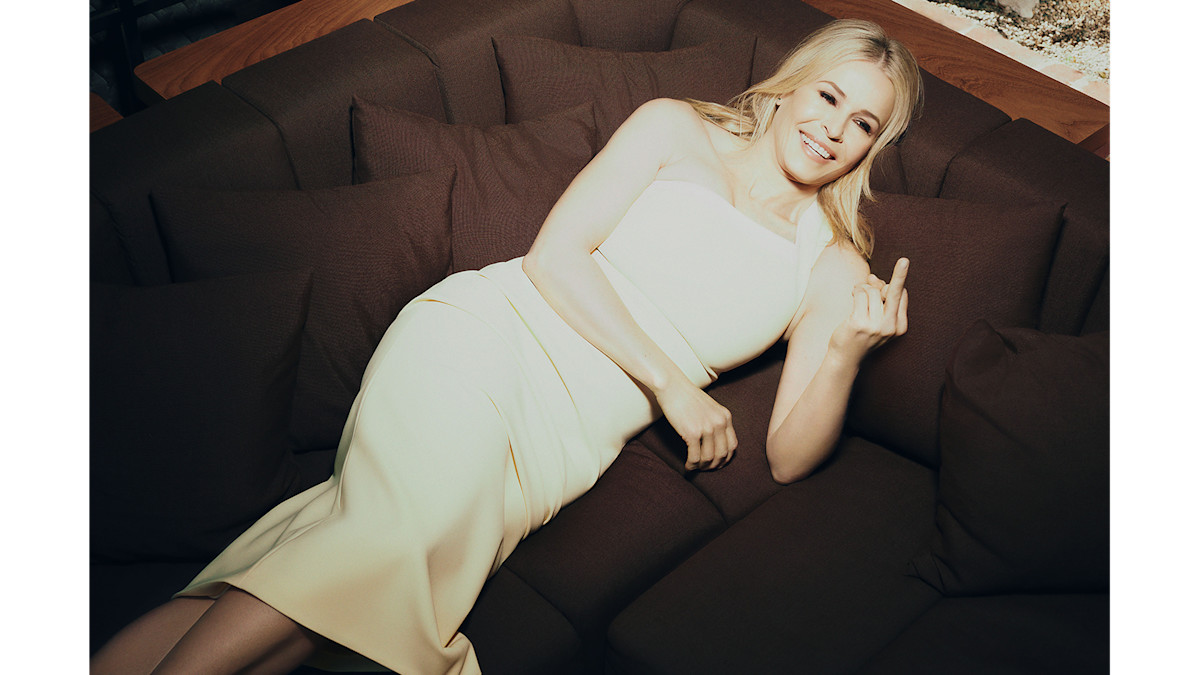
Christian Sirano Dress; Sarah Flint Pumps.
TR: Where do you think your creative talent comes from? Is there anyone else in your family that is creative? I don't know that I've heard you talk about that sort of thing.
CH: My dad wrote a lot. He wanted to be a poet, but it didn't work out. Two of my nieces and nephews are writers. I know that we have writing in our family. I think my great, great grandmother was a performer or comedian, something like that. I've heard something like that, but I don't know for sure. And there have been a lot of writers on my dad's side. Intellectuals; people who are writing for a living. I don't know a lot about my mom's side. It was Nazi Germany when my mom was a little girl. My grandfather actually served in the German army and was taken as a POW, to America, in Iowa.
TR: When I think of Chelsea Handler as a child, I think of someone who probably started thinking in quips and sound bites early on. Is that accurate?
CH: Yes. I was really full of piss and vinegar when I was born. I don't know where I got my personality from, but I was in charge from the minute I could talk. No one else in my family was going to tell me anything. I was in charge and I was like, 'Everybody, I'm the leader now.'
“For a long time you'd only see celebrities promoting their projects rather than getting personal. Now we're living a different kind of vibe. The more personal, the better.”
TR: Do you remember the exact moment, in what I think of as a first transformation in your life, when you connected your desire to be famous to your talents, and said to yourself, 'I can do something with this.' Do you remember when you reconciled the two, and decided, 'This is something that I'm going to go and make into something'?
CH: I don't know that you have talent, or in my case, I didn't know that I had talent. I knew I had something, but I wouldn't even categorize it as talent. I just wanted to be heard. I had things to say, and I wanted people to hear what I had to say, and I thought they would benefit from it.
TR: Do you think your desire to be famous was due to your parents' backseat style of upbringing, and how your brother's tragic death contributed to that, and the lack of attention that you were getting? Or was it simply that instinct that people feel when they say they're destined for big things?
CH: I thought that, and I think both things are true. I thought I was destined for big things, and also, I was neglected or wasn't given the soundstage that I thought I deserved, growing up. It reared its head in this way. Especially after my brother died, there was neglect and the inability to have the same amount of attention that I was used to. It wasn't there, there was just a vacuum. I'm sure both of those things contributed. I didn't know what I was going to do. I didn't know if I could act. I knew I couldn't sing or dance. I didn't know what I was going to be. I just had to keep looking and trying.
TR: You grew up reading and you still love reading to this day. Do you attribute your way with words and writing skills to always having been an avid reader? Or is it something else? Is it a combination of things?
CH: I'm verbal so that practice is what makes me more verbal. Reading doesn't hurt, it only helps with vocabulary. I certainly know many more words than I would have, had I not read them, because I look every word up. So, yes, definitely.
TR: How do your processes for comedy writing and book writing compare? How are they similar and how are they different? Do you have to get in a different zone for each?
CH: They kind of bleed together, in a way. If I write a book, usually it's a true story that I can easily make into stand up. When I do stand up, it's basically a string of stories about real things that have happened in my life. The two crossover a great deal.
TR: In a bit from Evolution, I loved your irritation with massage and how the massage therapist always wants to make a big deal about how we need to take our time getting off the table. And there's always that cup of water that no one ever wants. It's all ridiculous. Have you developed a pandemic peeve?
CH: I like how everyone's masking changes based on whatever event they're going to. I mean, no one has a mask plan that is across the board for what they do in every situation. Everyone is influenced by another person, or another group of people. It's just absurd. 'Oh, are you wearing a mask? I'll wear a mask.' People don't have a mandate for themselves. They're wearing a mask based on whether you want them to wear a mask. And if left to their own devices, most people wouldn't be wearing one. So I think that's a peeve. It's like, have a plan and fucking stick to it.
“People don't have a mandate for themselves. They're wearing a mask based on whether you want them to wear a mask. And if left up to their own devices, most people wouldn't be wearing one. It's like, have a plan and fucking stick to it.”
TR: How and when do you get your best ideas? Of course we can look at your body of work and see recurring themes, and the subject matter that's important to you, but is there a way in which ideas spark within you? Do you carry them around with the goal of turning them into something?
CH: Yes. I think there are certain creative times in your life, when you're really creative. Then, you put it out there. And then, you recover from that. Then comes another creative juice. Certainly that's my pattern, anyway. I usually have a burst of creativity that will be three months of creating something, creating something, creating something. And then that turns into, for instance, a book. And then the book turns into a stand up tour. And then the stand up tour turns into a stand up special. It becomes a bowling ball of things stemming from one thing, there's an evolution throughout, in how the material will change. Then I take three months and I ski, not being creative at all.
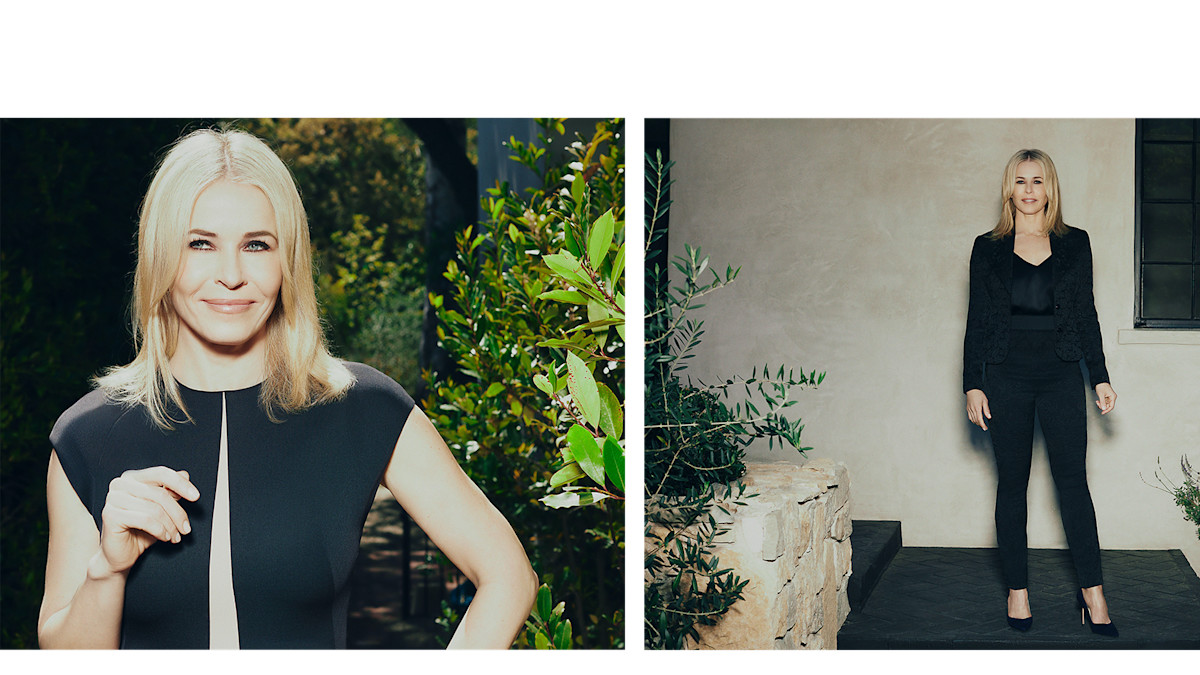
LEFT: Narciso Rodriguez Dress; Stuart Weitzman Pumps. RIGHT: Dolce + Gabbana Suit; L’Agence Top; Sarah Flint Pumps.
TR: Would you say that when a big idea hits and you go on that journey with the idea or set of ideas, that's when you need take a break?
CH: Yes. You have to let your brain stop. You have to let your brain relax if you want something unique to come to it. I speak for myself, obviously, but I like to give everything a rest, and not be so focused on, 'Oh, my God, what am I going to do? What am I going to create?' I don't want to be anal retentive about anything.
“I could see myself coming back to [a talk show] now, now that I've had enough space from it, I and I'm getting to do what I really want to do, projects with meaning.”
TR: How and where do you record your ideas? Is it the Notes app on your phone? Or is it notebooks? Are you the kind of person that wakes up in the middle of the night and has to jot things down?
CH: Yes, I write a lot of notes down, handwritten notes. Then, like a month afterwards, I'll go through them. Or they could sit there for two months. then I'll sit down and see that they are stand up notes, or a funny thing I heard or someone say, or blah, blah, blah." And Notes on my phone, for sure.
TR: Speaking of topics of content, why do you think the subject of alcohol and drugs has been a recurring theme in your work? Is it as simple as it's a topic that many people in this country can relate to?
CH: I talk about both things a fair amount because I believe in normalizing things that people like to stigmatize. The more you can talk about abortions, drugs, and alcohol like it's no big deal--- it becomes less of a deal.
TR: Your documentary on being white and privileged is particularly timely right now. When you look back at Hello, Privilege. It's Me, Chelsea, how do you feel about it?
CH: I feel glad that I was brave enough to do something that everyone told me not to do. Every white person was like, 'Don't do that. Don't do that.' And I said, 'We should do it. It's our privilege. We should be talking about it.' So many directors were scared to do it with me. It was a great experience. I worked with an awesome director who I hope to work with again. I know it was thought provoking, and people responded to it in a great way. I believe white people have a bigger responsibility to show up and choose projects that put themselves on the line, projects that expose their own entitlement and privilege--- as often as possible. We have to all be braver.
“I believe in normalizing things that people like to stigmatize. The more you can talk about abortions, drugs, and alcohol like it's no big deal--- it becomes less of a deal.”
TR: At the beginning of the documentary, you're at a talk at the University Of Southern California, and you're called out for your use of the word 'Uganda' in the title of your book and your show. And then someone quite literally says to you, 'Being here to learn about white privilege is the definition of white privilege.' Did you see that coming, or were you surprised by those comments and views?
CH: I'm always ready for that. But I didn't see it coming. And I also wasn't surprised.
TR: The rapper Jelly Roll makes an appearance in Hello, Privilege. It's Me, Chelsea. Something that resonated with me that he said was, generally speaking, ultimately the problem our country is that there is a constant need to put people in boxes all the time, it's an overarching problem. What is your own view on that?
CH: I'd say that I would agree with that for sure.
TR: On stage during your Evolution show, you have a bowl of oranges next to you. And you explain that in the beginning of therapy with your psychiatrist, Dan, he offered you an orange that he picked from a tree of his. It opened up everything for you. You began hysterically crying. Now that you've had a lot of time to reflect on that moment, why do you think it hit you that way? Was it a simple act of kindness, something someone was giving to YOU, that struck you? You've said that your own generosity gives you joy, and gives you purpose. What was it about that moment that hit you the way that it did?
CH: It hit me the way that it did because it required me to be vulnerable. It required me to say thank you to a man for doing something nice for me. I wasn't able or willing to do that. In that moment, that was my realization. I realized he had done something nice and I couldn't even tell him, 'Thank you'. I had to be defensive. It was like, 'I hate oranges. How could you give me something that color? You know how I feel about that color since the election...'
“It required me to say thank you to a man for doing something nice for me. I wasn't able or willing to do that. And in that moment, that was my realization. I realized he had done something nice and I couldn't even tell him, 'Thank you'.”
TR: There is a quote from your book, Life Will Be the Death of Me, that I loved. You say some people are just interested in surviving. Doing their best doesn't even occur to them. That's kind of profound, really. Education, learning, and seeking are so important to you, and the basis for a lot of your content. What new subjects are you interested in today?
CH: I'm very interested in death. I'm very interested in parenting. I have a lot to say on parenting, because I have an objective look at all sorts of different kinds of parenting, and I know what's up. As a single person who chose not to contribute to all of the children in the world, I think I have something to say on the subject. I'm going to do something big with parenting, because I am ready to. The subjects I'm interested in are parenting, death. Anything with travel and learning, and anything involving experiences I haven't had. All sorts of drugs.
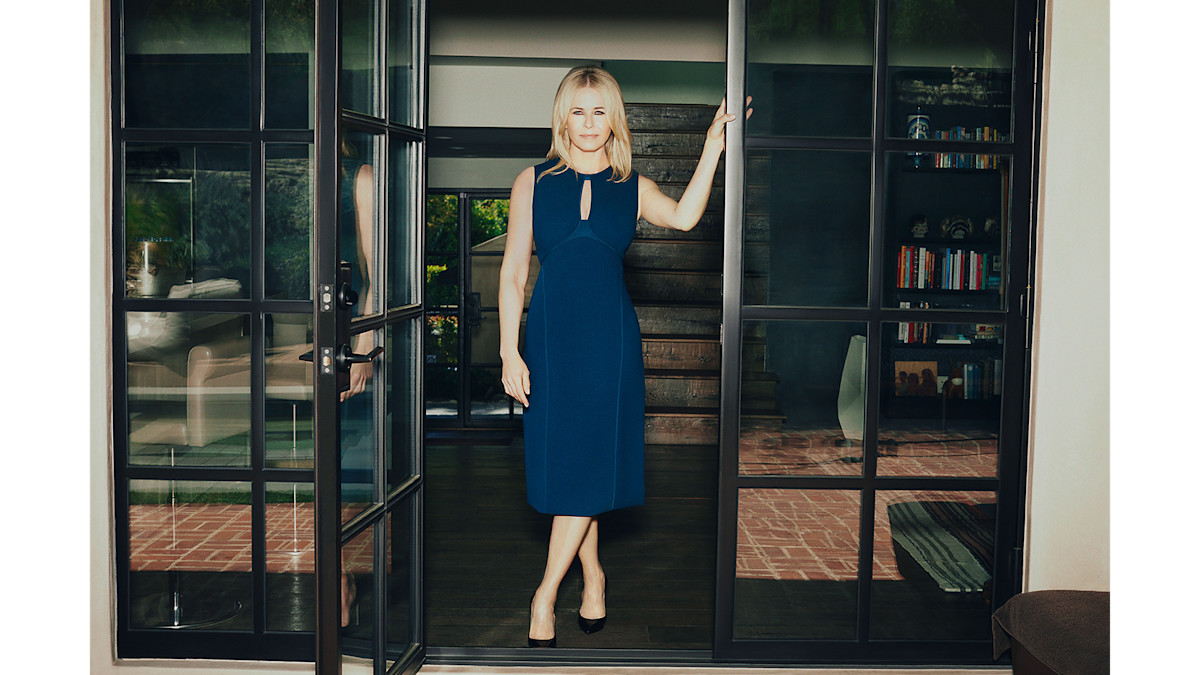
Narciso Rodriguez Dress; Sarah Flint Pumps.
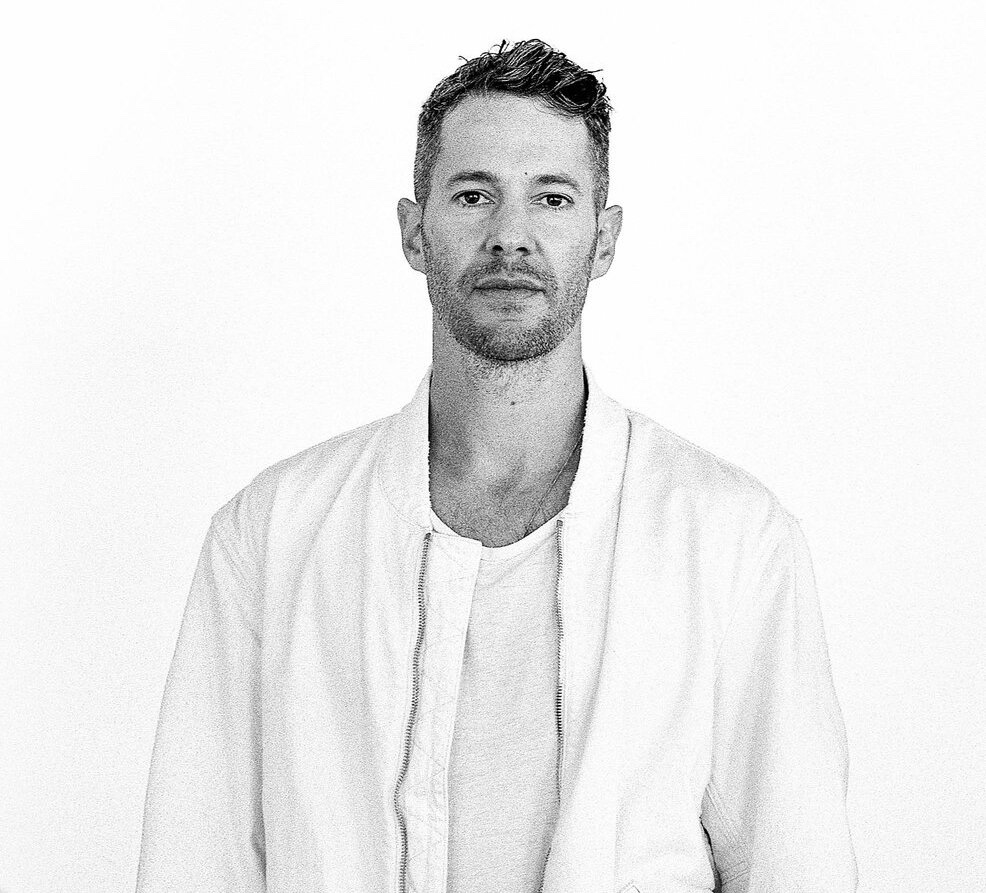
Story + Rain Photographer Mike Rosenthal
#BTS
MAY 2021 COVER
CHELSEA HANDLER
LOCATION
LOS ANGELES
PHOTOGRAPHER
MIKE ROSENTHAL
STYLIST
MOLLY FISHKIN-LEVIN
CROSBY CARTER MANAGEMENT
HAIR
CHRISTINE SYMONDS
THE WALL GROUP
MAKEUP
JAMIE GREENBERG
THE WALL GROUP
ASSISTANTS PHOTO: MORGAN DEMETER, ELIJAH AKALA, DANIEL MARTY. FASHION: REBECCA KAHANE
